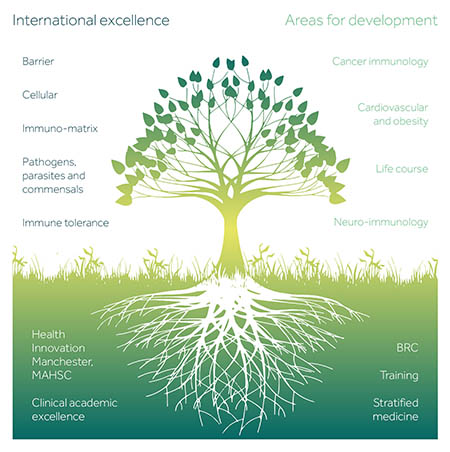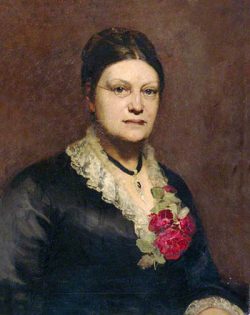
Launching the Lydia Becker Institute of Immunology and Inflammation
On the 18 October 2018 The University of Manchester launches a brand new Institute to perform exploratory science on some of the worst diseases we face today.
This launch is timely considering that this year’s Nobel Prize for Medicine was awarded to Professor James Allison, Professor and Chair of Immunology at the University of Texas MD Anderson Cancer Center, and Professor Tasuku Honjo, Professor of Immunology at Kyoto University, Japan. These immunologists discovered how to take the breaks off immune cells within tumours to help fight the disease.
 The importance of immunology in modern medicine is highlighted by the fact that over a quarter of all Nobel Prizes in physiology or medicine have been awarded in the field of immunology and infection. So why do we need a new institute?
The importance of immunology in modern medicine is highlighted by the fact that over a quarter of all Nobel Prizes in physiology or medicine have been awarded in the field of immunology and infection. So why do we need a new institute?
Well, this is an institute with a difference in that it removes traditional barriers that prevent exploratory scientists working together on common problems. Take our body surfaces for example. Our body surface is much more than just the skin. Our whole digestive tract, airways in the lung, and our mouth, eyes and urogenital tract are exposed to the outside world, much the same as skin. All of these areas have to be tolerant to harmless proteins we encounter – such as the food we eat and the air we breathe. Immune cells at these surfaces are specialised, but often go wrong to cause inflammation, allergies etc. The Becker Institute brings researchers working on these body surfaces together, because they can learn from each other.
 Similarly, cardiovascular disease is particularly associated with obesity and diabetes. Therefore why not study these conditions together. Treat the whole patient and not just the individual disease. Also, immunity in the very young is different to immunity in the adult and the elderly. Why segregate those researchers when there is much to learn from all age groups. The Becker Institute overcomes this by forming the ‘life course immunology’ branch.
Similarly, cardiovascular disease is particularly associated with obesity and diabetes. Therefore why not study these conditions together. Treat the whole patient and not just the individual disease. Also, immunity in the very young is different to immunity in the adult and the elderly. Why segregate those researchers when there is much to learn from all age groups. The Becker Institute overcomes this by forming the ‘life course immunology’ branch.
Another purpose of the Institute is to make the excellence of our immunology visible beyond Manchester. Fragmentation of researchers is a common problem in universities – and it is unnecessary. The University of Manchester has the largest number of researchers working in parasite immunology. This has been recognised for some time. However, who would have known that we have the largest grouping of barrier immunologists and that by citation rate of our publications over the last few years we are in the top two?
By forming the Institute we are poised to respond to national and global challenges. The concept of ‘multi-morbidities’ has come to the forefront recently. Patients rarely have one disease and yet discovery science looks at them in isolation. Scientists in the Becker Institute are keen to explore real disease combinations. Our immunological expertise will also provide a seamless interaction with other areas of excellence where an understanding of immune cells is critical. These include the Manchester Cancer Research Centre and the Wellcome Trust Centre for Cell Matrix Research.
The success of the Institute in the future relies on close interactions with the Faculty of Science and Engineering and the Faculty of Humanities. We will require, for example, novel delivery systems for new medicines. We also need to understand common disease clusters and the patient experience. Fragility, exhaustion and mental health are all linked to inflammation. Research is less valid without the tools developed by the Manchester Institute of Research into Ageing (MICRA) to assess these conditions. Allied health professionals are also critical for our goals, for example nursing in the study of chronic wounds.
An institute can also enthuse the next generation of academics. The University of Manchester provides degree and MSc, MSci and MRes qualifications in Immunology, Advanced Immunology and Clinical Immunology. We want these students to feel part of the Becker Institute.
 Finally, why name the institute after Lydia Becker? Lydia was a published and celebrated botanist, but is perhaps better known for her activities in the suffragette movement in the 19th Century. The John Rylands Library in Manchester houses most of her scientific contributions, including letters between her and Charles Darwin regarding the origin of the species. The Manchester Museum also houses specimens of her preserved plants. She was a critical force driving the inclusion of women in scientific discussion and so we are pleased to honour her in this way.
Finally, why name the institute after Lydia Becker? Lydia was a published and celebrated botanist, but is perhaps better known for her activities in the suffragette movement in the 19th Century. The John Rylands Library in Manchester houses most of her scientific contributions, including letters between her and Charles Darwin regarding the origin of the species. The Manchester Museum also houses specimens of her preserved plants. She was a critical force driving the inclusion of women in scientific discussion and so we are pleased to honour her in this way.






0 Comments